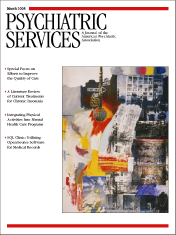A Lifestyle Physical Activity Program for Persons With Serious Mental Illness
Lifestyle physical activity programs encourage participants to integrate physical activity, usually walking, into their daily routine. These programs have been very successful in healthy populations but have not been tested extensively in individuals with serious mental illness.
To test the feasibility of a lifestyle intervention designed for individuals with serious mental illness, researchers at the University of Michigan developed the Michigan Walk Your Talk Program, a group-based 18-week lifestyle physical activity intervention. The group sessions were conducted weekly for six weeks in the initial phase and then monthly for three more months. Sessions were led by a trained fitness and nutrition group leader. Each session included education and behavior modification strategies that focused on nutrition and physical activity as well as a 15-minute group walk. Participants were asked to wear pedometers for the entire 18 weeks and to log daily step counts on a calendar.
The intervention was offered in three different mental health settings that were chosen to target groups that varied by severity of mental illness. The settings included a university-based outpatient depression center, a community mental health center, and a clubhouse program for individuals disabled by mental illness. Thirty-nine participants were recruited. Five dropped out before the first intervention session, and 34 started the intensive phase of the intervention (eight men and 26 women; mean age, 44 years). Twenty-two remained in the program until the end of the six weeks (six men and 16 women; mean age, 43 years). Twelve (two men and ten women; mean age, 48 years) completed the final questionnaire three months after the intensive intervention.
Most participants were able to record daily pedometer step counts on paper log sheets. No statistically significant increase in step counts resulted from the intervention. The ten participants who completed the program and for whom both baseline and 18-week weight data were available lost an average of 5.3 pounds (paired t=1.9, df=9, p=.045). Several members of one group spontaneously organized a walking group after the 18-week program ended. Currently 14 people with serious mental illness walk together each week at a local shopping mall.
Despite concerns that lifestyle interventions might be too unstructured for individuals with serious mental illness, our low-cost, group-based lifestyle intervention was associated with a significant weight loss that was maintained for 18 weeks. Although the initial dropout rate was disappointing, satisfaction was high among the individuals who completed the program. Furthermore, the intervention motivated some participants to organize their own walking group. We are currently conducting an ethnographic study of the walking group to determine whether this type of program can be replicated for other individuals with serious mental illness.
Dr. Richardson is assistant professor in the department of family medicine at the University of Michigan with a joint appointment in the Health Services Research and Development Center of Excellence at the Ann Arbor Veterans Affairs Medical Center, 1018 Fuller Street, Ann Arbor, Michigan 48109 (e-mail, [email protected]).



